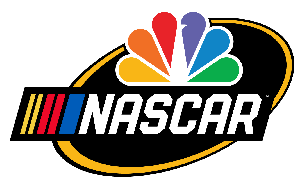
Michael Kinsey Joy is an American TV sports announcer and businessman who serves as the play-by-play commentator for Fox Sports' NASCAR coverage. His color analysts are Clint Bowyer and Kevin Harvick. Joy has been part of the live broadcast crew for 45 Daytona 500s. He also serves as expert analyst for A&E Networks History Channel and FYI live TV coverage of collector car auctions.
NASCAR on Fox, also known as Fox NASCAR, is the branding used for broadcasts of NASCAR races produced by Fox Sports and have aired on the Fox television network in the United States since 2001. Speed, a motorsports-focused cable channel owned by Fox, began broadcasting NASCAR-related events in February 2002, with its successor Fox Sports 1 taking over Fox Sports' cable event coverage rights when that network replaced Speed in August 2013. Throughout its run, Fox's coverage of NASCAR has won thirteen Emmy Awards.

NASCAR on NBC is the branding used for broadcasts of NASCAR races that are produced by NBC Sports, and televised on several NBCUniversal-owned television networks, including the NBC broadcast network in the United States. NBC originally aired races, typically during the second half of the season, from 1999 to 2006.
Motor Racing Network (MRN) is an American radio network that syndicates broadcasts of auto racing events, particularly NASCAR. MRN was founded in 1970 by NASCAR founder Bill France, Sr. and broadcaster Ken Squier, and is a wholly owned subsidiary of NASCAR. Its first broadcast was the 1970 Daytona 500.
The television and radio rights to broadcast NASCAR are among the most expensive broadcast rights of any American sport, with the current television contract with Fox Sports and NBC Sports being worth around US$8 billion.

NASCAR on TNT is the branding for NASCAR races broadcast on TNT by TNT Sports. TNT is currently slated to begin airing events beginning with the 2025 NASCAR Cup Series season.
Kenley Dean Squier was an American sportscaster and motorsports editor from Waterbury, Vermont. From 1979 to 1997, he served as the lap-by-lap commentator for NASCAR on CBS, and was also a lap-by-lap commentator for TBS from 1983–1999. Squier was the first announcer to give lap-by-lap commentary for the Daytona 500 in 1979. He coined the term "The Great American Race" for the Daytona 500 and helped introduce the Australian-developed in-car camera for the 1982 running of the event. He lived in Stowe, Vermont until his death.
NASCAR on CBS was the branding formerly used for broadcasts of NASCAR series races produced by CBS Sports, the sports division of the CBS television network in the United States from 1960 to 2000.
NASCAR on TNN was the name of a television program that broadcast NASCAR races on The Nashville Network.
NASCAR on USA is the branding used for broadcasts of NASCAR races that are produced by NBC Sports and televised on several NBCUniversal-owned television networks, including USA Network in the United States. The network originally aired races, typically during the half of the season, from 1982 to 1985.
IndyCar Series on NBC was the blanket title used for telecasts of IndyCar Series racing produced by NBC Sports.
One of the earliest telecasts of a NASCAR race was the 1960 Daytona 500, parts of which was presented as part of CBS Sports Spectacular, with announcer Bud Palmer.
Before the existence of ESPN, live coverage of NASCAR Winston Cup races on television was limited. CBS covered the Daytona 500, the June race at Michigan and the July race at Talladega. ABC usually did the Atlanta race in the spring.
As time passed, more Winston Cup races ended up on TV. ESPN broadcast its first race in 1981, from North Carolina Motor Speedway, and TNN followed in 1991. All Cup races were nationally televised by 1985; networks struck individual deals with track owners, and multiple channels carried racing action. Many races were shown taped and edited on Wide World of Sports and syndication services like Mizlou and SETN, but almost all races were live by 1989. By 2000, the last year of this arrangement, six networks televised at least one Cup series race: CBS, ABC, ESPN, TNN, TBS, and NBC.
Until 2001, race tracks struck individual agreements with networks to broadcast races, but NASCAR wanted to capitalize on the growing popularity of the sport and announced in 1999 that television contracts would now be centralized; that is, instead of making agreements with individual tracks, networks would now negotiate directly with NASCAR for the rights to air a package of races.
On December 7, 2005, NASCAR signed a new eight-year broadcast deal effective with the 2007 season, and valued at $4.48 billion, with Fox and Speed Channel, which would also share event rights with Disney-owned ABC, ESPN and ESPN2, as well as TNT. The rights would be divided as follows:


